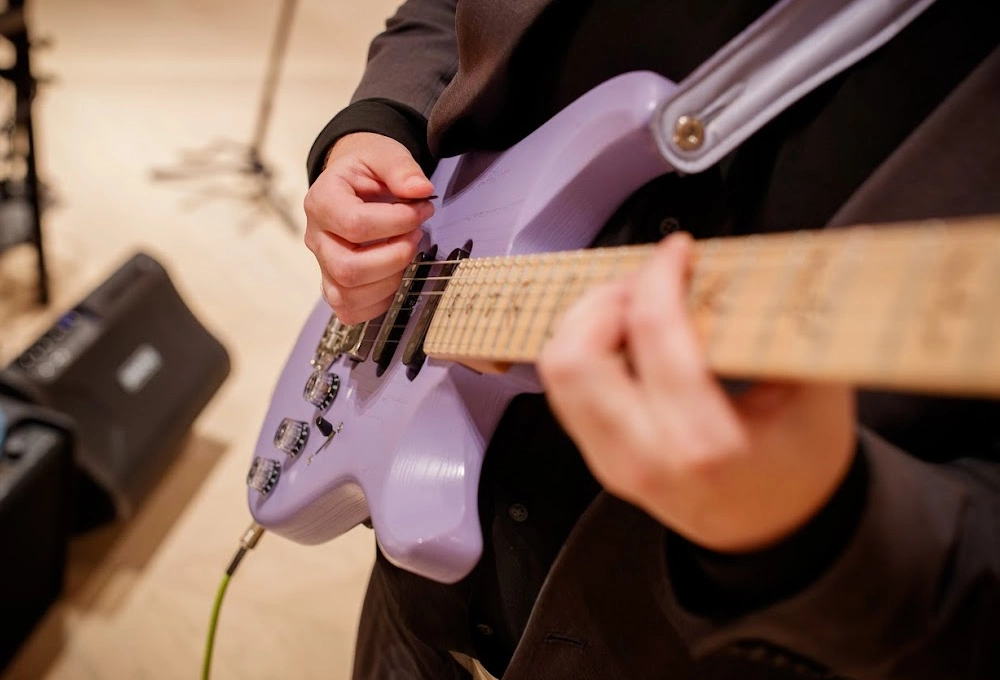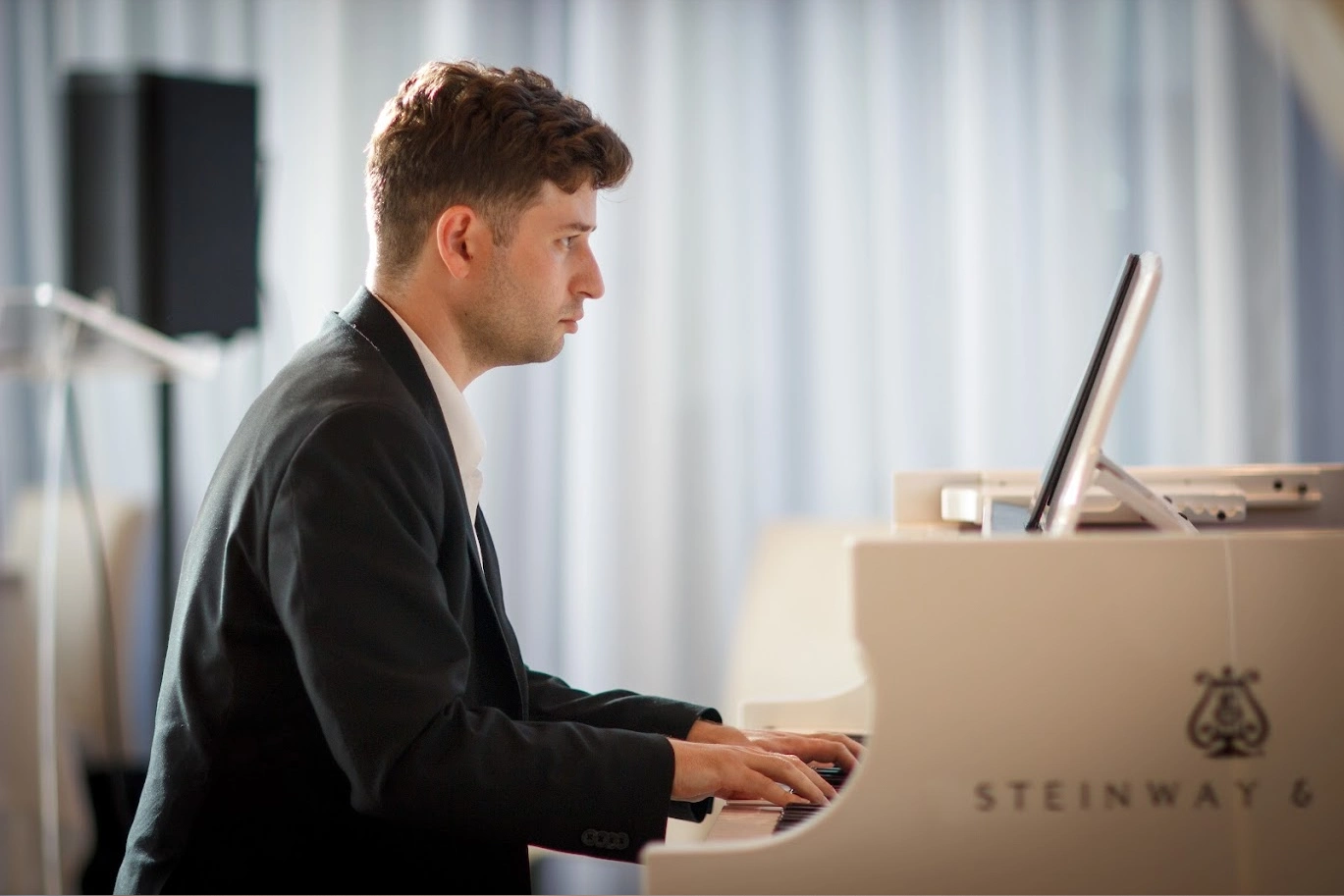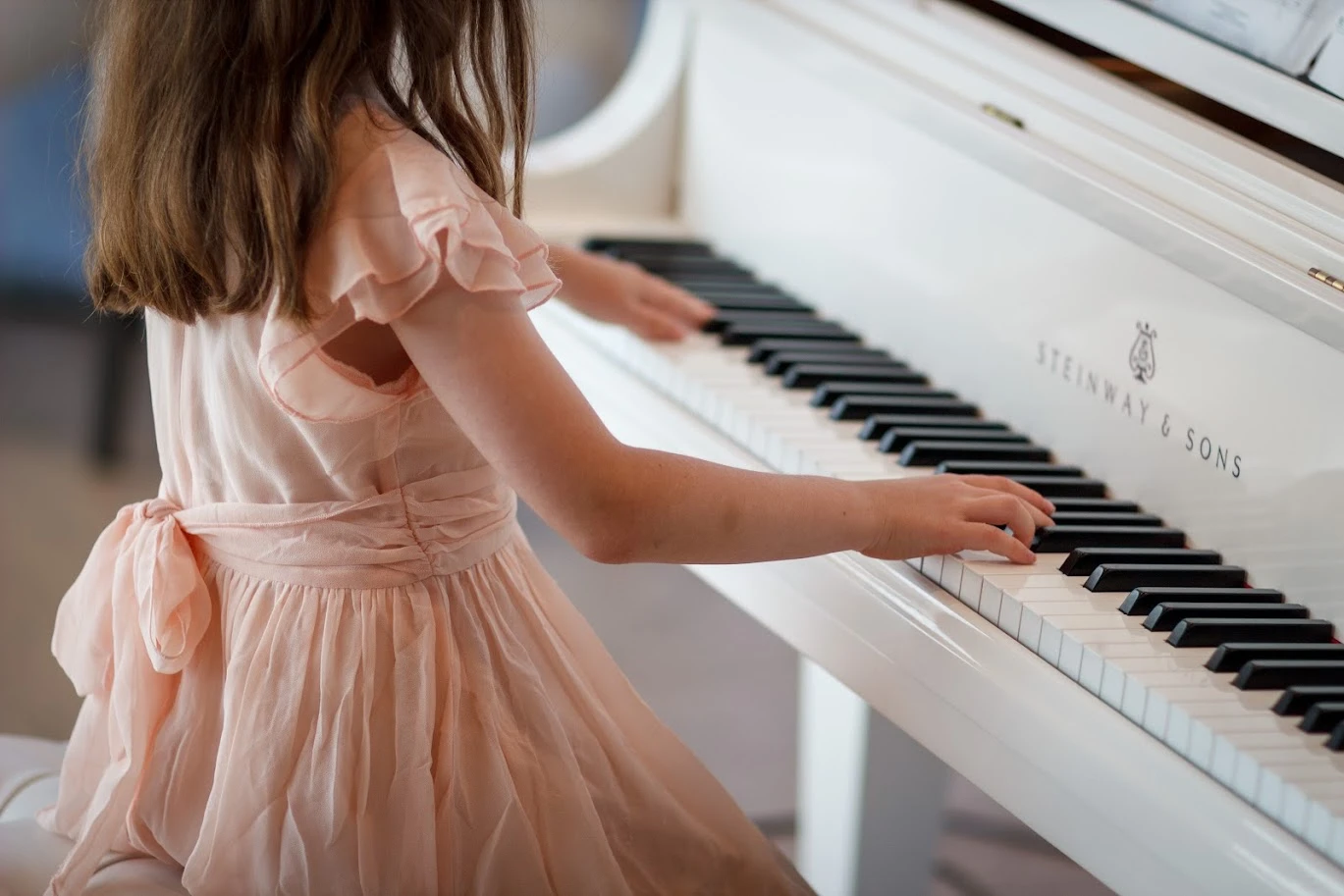Guitar lessons for kids can be one of the most rewarding investments a parent makes. Beyond learning music, children develop cognitive skills, discipline, and self-expression.
If you're a parent googling things like "guitar lessons near me for kids," you're already taking the first step toward unlocking a lifelong love of music in your child. With the right guidance, guitar lessons can become a joyful experience that lasts a lifetime.
In this article, we’ll explore how to make guitar lessons engaging, why in-person lessons are preferred for young students, how to choose the right program, and why parents across LA trust Angeles Academy of Music for guitar instruction.
Why Guitar Lessons Are Important for Kids
Learning the guitar supports much more than music proficiency. Scientific research has shown that music education improves memory, coordination, and academic skills.
A 2006 study in Brain found that early musical training enhances verbal memory and literacy development in children.
From a psychological standpoint, music training fosters emotional intelligence, patience, and goal-setting. Children who regularly practice the guitar develop better focus, confidence, skills, joy through music, and a strong sense of self-discipline.
They learn to handle challenges, perform in front of others, and celebrate personal achievements.

Starting young also matters. Research from the University of Southern California’s Brain and Creativity Institute found that children who began music training before age 7 showed significantly better development in auditory and motor regions of the brain.
In a city as culturally vibrant as Los Angeles, guitar lessons give kids an edge, not just musically, but communally and emotionally.
How to Make Guitar Lessons Fun for Kids
If you’re wondering how to make guitar lessons fun for kids, the answer lies in psychology-informed teaching strategies that spark engagement, mimicry-based learning, and social immersion.
Children are natural imitators. According to developmental psychologists like Dr. Andrew Meltzoff (University of Washington), young learners acquire skills by mimicking others’ behavior, facial expressions, tone of voice, and body language.
For kids, along with technicals in guitar lessons: chord and finger picking, mindful interactions are also important.
That makes the presence of an engaging teacher not just beneficial, but critical. In-person lessons provide real-time, nuanced human interaction that video simply can’t replicate.

A great teacher is more than just a music teacher, but a role model, who can inspire the child to fall in love with the subject of music.
Here are expert-backed techniques top music educators and researchers recommend for keeping children engaged and happy:
- Model Enthusiasm and Energy
Kids subconsciously adopt the posture, tone, and excitement level of those they watch. When teachers demonstrate joy while playing, children often mirror this attitude. This is harder to recreate in online environments, where energy transfer is limited.
- Group Learning Opportunities
Including children in small ensemble practices, such as group guitar classes or beginner rock bands, to help build motivation. Peer interaction and the "musical conversation" of playing with others strengthen rhythm, timing, and social-emotional learning.
According to a 2014 study in Frontiers in Psychology, collaborative music-making and similar creative activities increase empathy and group cohesion.
- Integrate Singing and Movement
Singing along to a song or walking to a beat while strumming engages multiple learning pathways. Kinesthetic learning reinforces memory. Encouraging kids to tap their feet or move to rhythms can dramatically boost retention and reduce frustration.
- Create Musical Games with Purpose
Instead of traditional drills, introduce activities like:
- "Chord Detective": Find and strum the hidden chord in a melody.
- "Tempo Freeze": Play a piece while the teacher periodically pauses to test reaction.
- "Follow the Leader": Mimic a short melody or rhythm using visual and auditory cues.
- Frequent Opportunities to Perform
Whether it's a solo at a family dinner or a recital at Angeles Academy, performance gives kids something to work toward. Anticipating a "stage moment" energizes practice and builds confidence. In-person performances, particularly with peers, provide the motivational fire that online platforms often lack.
- Let Kids Help Set Goals
Allowing young students to pick a song or choose which skill to work on next gives them a sense of ownership. According to the American Psychological Association, children who feel agency in their learning are more motivated and better able to overcome setbacks.
- Break Down Goals
Instead of long, overwhelming assignments, split lessons into bite-sized objectives like "learn G chord" or "play the first line of a song." Kids love celebrating small wins.
- Incorporate Games
Turn lessons into playful experiences. Rhythm clapping, chord-matching games, or "play and freeze" challenges make sessions dynamic.
Alternate between strumming, fingerpicking, singing, and playing along with tracks. It breaks monotony and keeps kids curious.
- Reward Effort:
Positive reinforcement, like stickers or a mini-performance for family, boosts motivation. Using practice charts, colorful stickers, and personalized milestone celebrations also help. Psychological research (Ryan & Deci, 2000) supports that autonomy and positive reinforcement are key to long-term motivation in children.

Most importantly, praise the effort, not just accuracy. At the same time, it’s important not to make a child addicted to affirmations and approval. It’s a very fine line that one has to follow while rewarding for effort.
At Angeles Academy of Music, instructors are trained to blend structure with creativity, combining proven pedagogical approaches with child-friendly customization. We don’t just teach guitar lessons for kids; we create lasting musical experiences grounded in emotional intelligence and cognitive science.
By keeping lessons interactive, expressive, and socially enriching, we ensure that every child not only learns the guitar, they love the journey.
- Bonus: Use Songs They Love
Children stay more motivated when they play music they know. Whether it’s a Disney hit or a simple pop melody, incorporating familiar songs helps them enjoy the process.
5 Easy Songs For Kids to Play on Guitar
The best and simplest songs that kids can play on a guitar are Twinkle Twinkle Little Star, Row Your Boat, Three Little Birds, You Are My Sunshine, and Old MacDonald Had a Farm.
In-Person vs. Online Guitar Lessons for Kids
While online guitar lessons for kids offer flexibility, in-person sessions provide critical advantages, especially for younger learners.
Why In-Person Works Best:
- Immediate Feedback: Teachers can instantly correct posture, hand position, and rhythm issues.
- Better Engagement: A dedicated studio minimizes distractions. Kids focus better in a space built for learning.
- Tactile Learning: Young children benefit from hands-on guidance and physical interaction with instruments.
- Social Connection: Kids feel more accountable and excited when they connect face-to-face with a supportive mentor.
That said, guitar lessons for kids online can serve as a useful supplement or alternative when in-person isn’t possible.
Choosing the Right Guitar Lessons for Kids in Los Angeles
Los Angeles is full of choices for music education. But how do you pick the right one?
Here are some key factors to consider:
Age and Instrument Size
- Ages 4-7: Ukulele
At Angeles Academy of Music, we typically recommend beginning formal guitar lessons at age 7 and above. For younger children (ages 4–6), the ukulele is a better starting point. It’s lighter, easier to hold, and has just four soft, manageable strings—making it ideal for smaller hands and developing coordination. It also helps build foundational musical skills that transfer smoothly to guitar later on.
- Ages 7-12: Acoustic Guitar with Nylon Strings
Children in this age range are typically ready for a nylon-string acoustic guitar, which is gentler on the fingers and easier to learn on. Choosing the right program is essential—look for schools with experience teaching young beginners.
At Angeles Academy of Music, all instructors go through our proprietary training program to ensure a structured, supportive, and engaging learning experience for kids.

- Teenagers: Acoustic/Electric Guitar
Teen students are cognitively more developed and able to grasp more complex techniques. While they may come with some preconceptions or hesitation, they also have the ability to progress rapidly and channel their energy into a rewarding skill.
We generally recommend starting with an acoustic guitar, unless the student shows a clear preference or interest in electric guitar. Acoustic guitars are lighter, simpler to maintain, and excellent for building foundational technique.
Electric guitars, while exciting and versatile, can be slightly heavier and require additional equipment like amplifiers, which can add complexity for beginners. That said, if a student is naturally drawn to the electric guitar, we fully support nurturing that interest from the start.
Acoustic vs. Electric Guitar Lessons for Kids
While acoustic guitars are ideal for building finger strength and technique, electric guitar lessons for kids are a fantastic option for older children and teens who are drawn to pop or rock genres. Electric guitars are often more exciting for beginners.
Private vs. Group Lessons
Private lessons offer one-on-one attention and we believe are the best way to accelerate learning. Group lessons, however, provide social interaction and can motivate kids through peer engagement. Angeles Academy of Music offers both formats and even hosts performance opportunities.
Teacher Qualification
Look for instructors with experience in early childhood education and a friendly, patient demeanor. Angeles Academy’s 100+ instructors are university-trained and background-checked, and the academy’s child-first approach is rooted in child psychology.
How Much Are Guitar Lessons for Kids in Los Angeles, CA?
The cost of private guitar lessons for children in Los Angeles typically falls between $60 and $150 per hour, depending on the teacher’s background and where the lessons take place.
- In the $60–$80 range, you'll usually find newer instructors or those who teach from home studios. They might be starting out or building their experience, but they can still offer solid instruction.
- Teachers charging $90–$120 per hour often bring several years of experience, a strong history of working with students, and some performance credentials. These are often full-time professionals with a balanced approach to teaching.
- At the top end ($130–$150 or more) are highly qualified instructors — possibly holding advanced music degrees, impressive performance histories, or specialized expertise in genres like classical, jazz, or advanced rock. These lessons often happen in professional music schools or high-end studios.
That said, a higher price doesn’t always equal a better fit. A costly teacher might have great credentials but may not connect well with your child’s personality or learning pace.
In many cases, a mid-range instructor with a down-to-earth style and a focus on core skills can help kids progress more quickly, especially if they’re patient, engaging, and tailor their lessons to suit young beginners.
Angeles Academy is a premium school, and the tuition is right in that mid-price range.
Ultimately, the best teacher is one who inspires your child, explains concepts clearly, and adjusts their approach to your child’s needs and goals.
FAQs from Parents
What’s the best age to start guitar lessons?
Children can begin formal guitar lessons as early as age 7, though some may be ready slightly earlier. However, in our experience, starting before age 7 is often too early, as younger students may still be developing the finger strength, coordination, and attention span needed for effective learning.
Maturity, hand size, and attention span are key factors in determining readiness.
That being said, there’s actually no right age if we are being honest. We have taught everyone, from teenagers, young adults, older individuals, etc. While it’s beneficial to start early, kids usually need the support of music in their teenage years the most.
We believe it’s never too early or too late to learn music.
So whenever your child is ready, get them started.

How often should my child practice?
Short daily practice sessions (20 minutes for young kids) are ideal. Consistency is more important than duration. However, the more the better. Once a child gains interest in the instrument, you’ll never see them without a guitar.
Many of our students’ parents tell us how they can’t get their child to stop playing. Ultimately, that passion leads to mastery of the instrument.
Should my child start on an acoustic or electric guitar?
An acoustic guitar with nylon strings is typically better for beginners because it’s less painful in the beginning as compared to metal strings. The electric guitar is possible for more dedicated students, but can be more challenging to start with because of the metal strings.
The upside for electric guitar is that kids can explore different tones and effects in electric guitar amps, but that may also be more complicated for them. Unless there is a strong preference, we always suggest beginner kids to stick to an acoustic guitar, and then graduate to an electric guitar once they have had some hold of the instrument.
Do kids need to read music?
Not at first. Many programs start with tablature or by ear. Reading music is introduced gradually and is not as important a skill in the modern age.
Are online guitar lessons for kids effective?
They can be, especially with committed parents and the right setup. However, in-person lessons offer more engagement and faster correction. If you can spare the time and attention required, you can go for it.
You should be aware, though, that learning wrong is as bad as not learning at all. Developing incorrect habits early on — such as poor finger positioning, posture, or strumming technique — can be hard to unlearn later and may slow progress or even lead to frustration and injury.
That said, online lessons can still be highly effective, especially when the instructor is experienced with teaching kids virtually. Many online teachers use tools like multiple camera angles, screen sharing, and interactive exercises to keep students engaged and learning effectively.
For best results, parents should be involved — helping younger kids stay focused, making sure the technical setup is working (camera angles, sound, tuning), and ensuring consistent practice.
If you're choosing online lessons, look for a teacher who specializes in working with children, offers clear guidance, provides feedback regularly, and makes learning fun. Some kids even thrive online because they feel more comfortable at home.
Angeles Academy of Music: Premier Guitar Lessons For Kids in Los Angeles, CA

If you're in Los Angeles and searching “guitar lessons for kids near me,” Angeles Academy of Music stands out for several reasons:
- Three convenient locations: Brentwood, Westwood, and Tarzana.
- Flexible scheduling: Seven days a week availability.
- Top-rated instructors: Highly trained, child-focused, and background-checked.
- Tailored curriculum: Songs your child loves, with a focus on confidence and enjoyment.
- Performance opportunities: Students perform in recitals, building poise and motivation.
- Track record with celebrity and local families: Trusted by hundreds of LA families.
With a team of over 100 instructors and decades of experience teaching children, Angeles Academy offers guitar lessons for beginners, advanced players, and guitarists of all levels, styles, and genres, and ensures each student receives expert, fun, and engaging music education.
Final Thoughts
Guitar lessons for kids provide much more than musical skill—they help children grow mentally, emotionally, and socially.
Whether your child is an energetic 5-year-old or a determined teen, the right guitar lessons will keep them inspired and progressing. In-person instruction, especially with a top-rated local school like Angeles Academy of Music in Los Angeles, ensures a personalized, effective, and joyful learning experience.
If you're ready to take the next step, contact Angeles Academy today to find the best guitar lessons for kids. From toddlers to teens, our tailored approach ensures that your child will stay engaged, encouraged, and excited to keep playing.
You can also read our articles on how long it takes to learn guitar.
.svg)
.svg)
.svg)
.svg)
.svg)
.svg)





.svg)